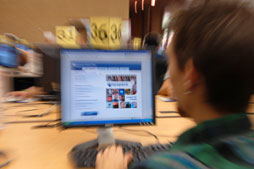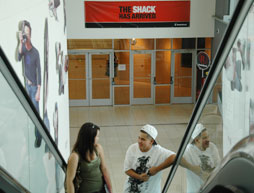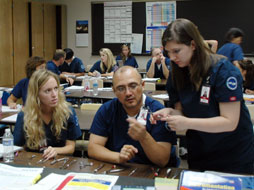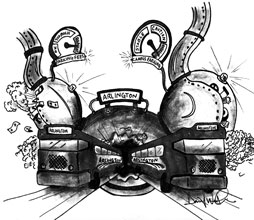By Kourtney Cribbs and Charles Swanigon/reporters

Most people join social networks like Facebook and MySpace to stay connected with friends and colleagues.
Facebook began as a site for college students to connect with classmates or alumni. Now, the free site no longer requires a college e-mail address for someone to register. People of all ages, including grandparents, can use Facebook. According to the blog of Facebook founder Mark Zuckerberg, the site reached 150 million members in January.
Twitter, an online communication service that allows people to write short updates of 140 characters or fewer, was relatively unknown a year ago. However, over the past year, Twitter has become a status-updating sensation and the quickest way to send messages.
In Time magazine’s most influential people issue, Ashton Kutcher wrote an article for the “micro blog” creators of Twitter. He noted that the creators, Biz Stone and Evan Williams, would be listed among the names of inventors such as Alexander Graham Bell and Samuel Morse.
For Kutcher, Twitter is his doorway to the causes he fights for and a way to express himself and connect with people from all walks of life.
However, people who have multiple online accounts can waste valuable time updating and monitoring them. The accounts can take away from personal relationships, schoolwork and jobs.
TCC counselor Anita Peters cautioned students who find they spend more time checking online postings and e-mails than spending “one-on-one” time with friends.
“This may be an indication that things are out of balance,” she said. “Texting and computers can be convenient when used as an adjunct to face-to-face communication. But when they become the primary mode of interacting with others, then it’s time to step back and work to create a better balance.”
The time spent online causes not just less personal interaction, but lower grades as well. In a recent study by Ohio State University, Facebook users had lower grade point averages than non-users. Network users studied five to 10 hours less than someone who did not have a Facebook account.
Students like Rebecca Hopkins disagree with this study.
“I spend time online, but I don’t let it rule my life,” she said. “You still have to keep your priorities in check.”
NE student Jaime Fuller is not concerned about the time spent social networking. At least twice a week, she dedicates an hour to Facebook and MySpace. She tries not to make her profile too personal and has never used either for business, but does refer friends.
“Facebook is more family-oriented,” she said.
Anyone over the age of 13 can be a member.
NE student Mike Williams also uses both Facebook and MySpace. He networks three or more hours a day, primarily to maintain long-distance relationships and promote upcoming events. He prefers social networking to instant messaging or e-mail because users can post pictures.
“MySpace is a flashy Web site,” he said. “Facebook is for real people.”
Patrick Leal, inline skater and student, uses the social networks as an opportunity to attract sponsors.
“Easy way to get in contact with sponsors,” he said.
He too uses both Facebook and MySpace. He believes he spends too much time networking but monitors his content and limits access to his picture album.
Tax collectors are getting in on the social networking craze. When account holders update their pages to remain current, not only do they keep their friends up-to-date but that information is also what collectors will use to track them down.
Anything posted publicly, which is the default for MySpace, is fair game in the quest to collect.
If students use social networks for professional reasons, many people would agree that it is important to consider the content on their pages and the pictures posted online.
Students should also be aware that employers want to see effective communicators who can use and understand nonverbal cues.
“Communication is about much more than words,” Peters said.
“Words alone can be impersonal. But gestures, tone of voice, physical proximity and facial expressions provide a uniquely human element and meaning to them.”
A study at UCLA found that up to 93 percent of effective communication is determined by nonverbal cues.
Peters believes that the individuals who can develop effective verbal and nonverbal communication will have successful relationships. Those who rely too much on “computer/written word language” will compromise relating to others in all areas of life.
For those who want to use their social network as a professional tool, it might serve them well to consider using a more professional online network like LinkedIn.
LinkedIn was created to meet professional and business needs. Like other online networks, users can connect with classmates and colleagues. On LinkedIn, contacts can write recommendations for colleagues and refer them to others in an industry.
Users of LinkedIn can create presentations for businesses or market themselves. Unlike Facebook and MySpace, where anyone can trade comments or tag one another in photos that might not present someone in the best light, users on LinkedIn can control their profile look.
Any social network can be used to work toward your professional goal. Like any other online resource, they are great tools to break the ice, but in the end, it is best used when followed up with face-to-face interaction.





























